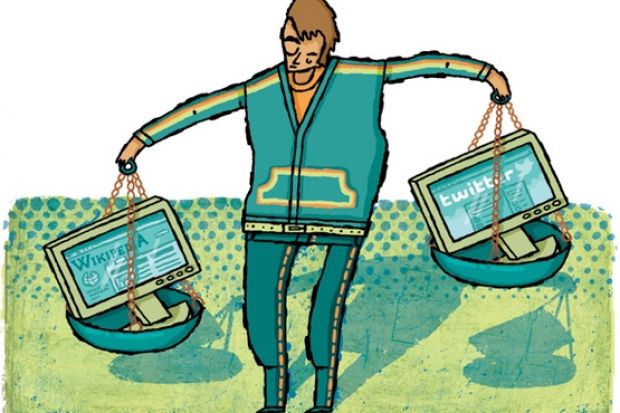A generation ago in universities, talk was of "computer literacy"; nowadays it's "media literacy" - if we can't handle Web 2.0, then we are failing our students. Having built a career around initiatives to meet this purported challenge, I offer some cautionary advice.
First, lay off the "literacy" metaphor. The ability to read and write needs to be achieved in childhood in order for cognitive development to proceed. Learning about information and communication technologies is much less vital. It is also asserted that digital technologies are so fundamental that someone ill at ease with them will be for ever disadvantaged. But hey, food is essential to everyday life, yet I don't hear calls that we become "food literate", even if lack of knowledge has demonstrably horrible consequences.
Media literacy is typically about technical skills, but the reasoning behind this prioritisation is flawed. There appears to be a belief that if students don't learn about the new technologies, they might cede power to experts who are technically able. But it can't be said loud enough that technical skills do not translate into power. The fact is that we live in an era when we are all dependent on expertise of one sort or another. We can't acquaint ourselves with every expertise going. We have to trust those experts who in their turn must rely on others. It is hard to see anything exceptional about ICTs in this regard. These technologies are indispensable, but as Max Weber observed about slavery, we ought not to confuse indispensability with power.
The fact is that how to use digital technologies is much less important than what the information accessed is for and what might be done with it. For this, one needs information skills - the sort provided by librarians and teachers. Here, educationalists might warn of risks with regard to lack of attentiveness, especially among the "digitally native". There is good evidence that most are superficial "skimmers", clicking hyperlinks and changing pages after a perfunctory glance. A few enthuse about this as a novel, non-linear practice, but most are concerned about the risks to logic and reasoning that can accompany a trend that succours facile and immediate gratification. As one student said about YouTube: "You can get a whole story in six minutes. A book takes so long."
We need to encourage close reading and the capacity to concentrate over lengthy and accumulating stretches of time; something that is jeopardised by the instantaneity and ease of the internet. We need to regain the confidence to insist that to gain intellectual competence requires hard work and perseverance. We need to insist that our students read for a degree; this demands time, focus and commitment.
We do need to be alert to the problem of information overload that requires filtering to cope with the excess. We can recognise "cocooning" - wrapping oneself in an information blanket that receives messages only from people like oneself. Without some cocooning, we would be hard pressed to get through the day, but we need to remain alert enough to admit information that is unfamiliar but important.
The only way in which this balance might be achieved is by education in the analysis and evaluation of information. We can access so much more than hitherto, but we need to combine openness and scepticism towards what is available on the internet (which is decidedly not the same as cynicism). We need to nurture in our students what Howard Rheingold calls "crap detector" tools - capabilities that help users to develop the ability to check authorities. Who owns the site? What is the affiliation of the author? Are sources cited? What qualifications does the writer have?
We should encourage users to develop appropriate filtering mechanisms. In this regard, Twitter has potential, since it allows one to select via tested sources, as well as to investigate through its search facilities and through one's own tweets that can call on a wide network.
So I urge people to use the interactive facilities of Web 2.0. These can stimulate and aid learning as well as provide opportunities to speak out. None of them requires us to embrace "media literacy" programmes, but they can cultivate critical thinking, the one ingredient that is essential in order to be able to prosper in the information age.
Register to continue
Why register?
- Registration is free and only takes a moment
- Once registered, you can read 3 articles a month
- Sign up for our newsletter
Subscribe
Or subscribe for unlimited access to:
- Unlimited access to news, views, insights & reviews
- Digital editions
- Digital access to THE’s university and college rankings analysis
Already registered or a current subscriber? Login
